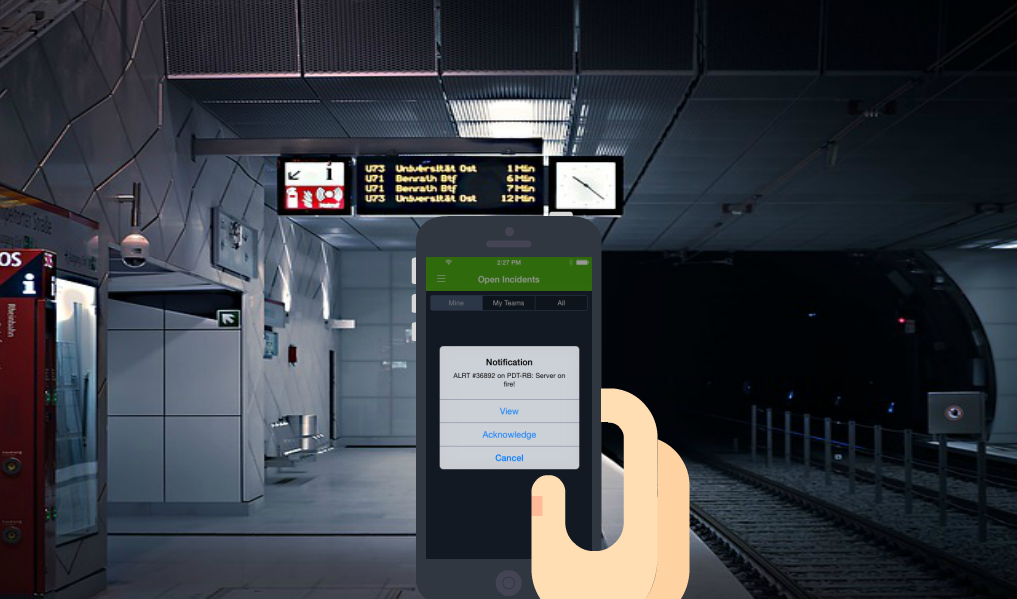- PagerDuty /
- Blog /
- Incident Management & Response /
- The On-Call Engineer’s Best Friend
Blog
The On-Call Engineer’s Best Friend
Have you ever returned to the office to find out that a server was down the whole night, and there was no way you could have been informed? If so, you probably need mobile incident management. In a world where almost everyone’s pockets are filled with smart devices, it would be a shame not to take advantage and make sure you’re not helpless when an incident occurs.

The Importance of Mobile Incident Management
Being mobile fills a critical gap in incident management, as unplanned incidents can strike at any time. Many incidents occur when team members are not at their desks or at their offices. They may even happen when team members are asleep. Incidents don’t wait for the appropriate time to occur.
That’s why mobile incident management is absolutely crucial. Mobile incident management provides you with a way to resolve incidents while on-the-go, from any device. It delivers a summarized view of alerts, stats, summaries, timelines, logs and so on. You can see who is on-call, and on-call team members get notified via the devices of their choice in real-time. Other useful features include the ability to assign teams, communicate and collaborate from anywhere, and integrate easily with other apps.
The Mobile Advantage
At first glance, mobile incident management might seem almost like a fad, following the trend of, “there’s an app for that.” But the advantages of mobile incident management cannot be ignored.
Installing an incident management app to your smartphone or tablet also means being integrated into all the features of your device. Compared to a PC, a smartphone is a more convenient method of communication. It has its own cellular data, can make calls, send emails, make video calls, and inform emergency services. While you won’t always have your laptop or desktop on you, you probably always have your phone on hand (or next to your head at your bedside). It also contains instant messaging apps, work files, and so on. This makes it the ideal device with which to be notified of an issue around the clock. Additionally, an incident management app will be integrated with all of your phone contacts, making it easy to automatically contact the right person with the right contact information to resolve incidents. You can also quickly triage and figure out if an incident is important from the app’s dashboard and the summary shown. This way, you can reassign or snooze incidents to be resolved later.
If you carry an incident management app with you, you’ll never have to miss another issue again, and you can leave your desk knowing you won’t have to worry about something happening while you’re away. Mobile incident management brings together the powerful automation of incident management with the fail-safe of reaching you anytime, anywhere.
How Does DevOps Benefit?
If you practice DevOps, there’s a lot to gain if your teams use a mobile incident management app. Staying informed of real-time issues that require a response is very powerful. It lets you be ready at all times, and take action on and resolve issues quicker. This enables you to spend more time focusing on innovating and collaborating better. Mobile incident management makes sure that everyone—Dev, QA and Operations—is equally involved in incident management. This collaboration can be a powerful thing and helps solve incidents more efficiently when everyone pitches in to find solutions. Your entire team will also get a boost of morale knowing that they have the ability to keep track of incidents at all times. This relieves a lot of pressure and lets them focus on the job at hand. And having everyone be on-call for code in production also incentivizes developers to deliver better code that can support production workloads. All of this combined speeds up and improves the quality of the development process significantly.
The On-Call Engineer’s Best Friend
On-call engineers are like the first-response team of emergency services. Mobile incident management makes their jobs a whole lot easier. It provides them with a streamlined solution for taking the appropriate action on incidents in real-time. It has everything important they need to resolve incidents including timelines/logs, assigning responders, and more. A mobile incident management app lets an on-call engineer quickly triage incident to understand its priority and any impacted services, surface remediation information, and either escalate, collaborate, resolve, or snooze–directly from their mobile device. This ensures no one’s time is wasted, allowing the on-call engineer to recruit responders or re-assign incidents only when they need to, and when it’s absolutely necessary. This minimizes unnecessary escalations, as incidents can get resolved much more quickly.
PagerDuty’s mobile incident management app (on iOS or Android) offers all of these capabilities—a centralized dashboard, vital statistics, incident reassignment, contacts integration, incident timelines, and more. User-specific permissions and fine-grained, custom access controls also are persistent across any device. It makes your incident management workflow a lot more streamlined. It offers quick and easy incident management from any device and reaches you wherever you are. It’s an absolutely indispensable part of your incident management process!
Interested in contributing to the PagerDuty mobile apps? Check out our openings and apply today!


